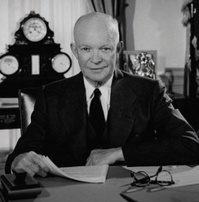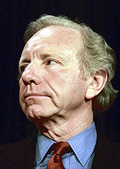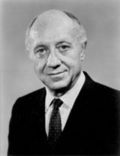It’s partly because of our longer life spans that the eerie, BizarroWorld comparisons between our time and 1967 come so easily.
In previous eras, hardly anyone then in public life had any real recollection of the previous crisis. No one who was an important figure in 1967 had much going for them in 1931, and none of the figures of 1931 had been figures in 1895.
It’s because that’s not entirely true, I think, that we fit into the opposite roles so easily today. And this is no more obviously true than where it comes to Democrats in Washington.
There actually are some Washington Democrats, like John Dingell, Edward Kennedy and Robert Byrd, who were in office way back then. Byrd has changed with the times, becoming more liberal and strident. Kennedy and Dingell remain what they were.
But these are a tiny minority. Most of Washington goes on blissfully unaware of past patterns, such as how much today’s Democrats sound just like the Eisenhower Republicans of a generation ago.
They have a lot in common. Just like today’s Democrats, the
Eisenhower Republicans spent their careers in a minority role. They
leaned into the liberal wind of the Roosevelt New Deal thesis, trying
only to accommodate it, to moderate it in small ways. Eisenhower
himself dealt with Democratic Congressional majorities for most of his
term, just as Bill Clinton did Republican majorities 40 years later. He presided over an
issue of relative peace and prosperity, just as Clinton did. Good times.
Moderates, then and now, see themselves as statesmen. They are, in
fact, merely obstacles. Their role is mainly to say no, to reduce the
pace of change as much as they can.
There were two types of Eisenhower Republicans. There were the Main
Street Republicans, such as Everett Dirksen, who would hold out for the
best possible deal and sometimes vote "nay" to protect themselves from
constituent wrath. And there were the Wall Street Republicans, like
Nelson Rockefeller and Jacob Javits, who were actually supporters of
the New Deal’s mission and sought only to make it appear fairer to
their constituents.
Today’s analogs to these groups are the Washington "Village" Democrats and Bush Dogs.
Rahm Emmanuel, a favorite whipping boy of the Netroots, is among the
former. He was a Clinton Administration official known for his
ruthlessness, and as a Chicago Congressman he’s still ruthless. But
ruthless in pursuit of what, exactly? Power is the answer. Emmanuel,
like Dirksen before him (Dirksen was also from Illinois) seeks to
exercise power, even if it’s negative power. But he does want to see
power exercised, and so when push comes to shove his instincts take
over and he bends over in the wind, accepting conservative talking
points as truth when they’re not, advising strategies of compromise
rather than confrontation.
Joe Lieberman is the best-known Bush dog, a bete noir for the
Netroots. He was elected as a conservative alternative to Republican
Lowell Weicker, much as Javits beat a relatively-conservative Democrat,
Robert Wagner, to win his seat. He accepts all the Bush premises, and
gets angered when other Democrats do not. Over time he has made himself
increasingly obnoxious to his own party, as Javits did, yet Javits
stayed in office until 1980,
after he’d been diagnosed with ALS (Lou Gehrig’s Disease), losing to Al
D’Amato because Republicans feared the Democratic Governor would
appoint a Democrat to succeed him.
While Republicans were a relatively small minority in the Congresses
of the 1960s, Democrats were badly split between their liberal northern
wing and their conservative southern wing. This gave the minority
leaders of that time great power, but it was power they seldom
exercised in the Congresses of that time.
Just as the current Democratic majorities are narrow, with plenty of
Bush Dogs and fearful Washington Democrats among them to thwart what
their party’s grassroots want, which in this case is an end to the war
in Iraq.
And so history repeats, in equal and opposite directions, a
generation apart. Today’s liberal grassroots are as activated as
movement conservatives were then, and feel as powerless as movement
conservatives did then.
The conservatives of that time never forgot,
and never forgave — they continue their eternal search for enemies and scapegoats to
this day.
May the Netroots learn at least from that example.















Very interesting blog, a really unique take on politics amid the hyper-partisan and candidate centric blogs that dominate the niche.
You might consider participating in a carnival on BlogCatalog.com by blogging on the topic
The Biggest Obstacle To Electing The Right Presidential Candidate
http://www.blogcatalog.com/group/skilled-political-debate/discuss/entry/the-biggest-obstace-to-electing-the-right-presidential-candidate
The topic would be a good fit with your niche and BC is planning to do some major PR for entries received by mid month.
For questions or to enter your post link to the carnival e-mail libdrone at gmail dot com.
Very interesting blog, a really unique take on politics amid the hyper-partisan and candidate centric blogs that dominate the niche.
You might consider participating in a carnival on BlogCatalog.com by blogging on the topic
The Biggest Obstacle To Electing The Right Presidential Candidate
http://www.blogcatalog.com/group/skilled-political-debate/discuss/entry/the-biggest-obstace-to-electing-the-right-presidential-candidate
The topic would be a good fit with your niche and BC is planning to do some major PR for entries received by mid month.
For questions or to enter your post link to the carnival e-mail libdrone at gmail dot com.
Excellent points all.
Have you read Jared Diamond’s “Collapse”? He focuses on the idea that longer lifespans may be what saves us as a species and our cultures since we CAN now remember prior crisis and write down information for future generations.
Excellent points all.
Have you read Jared Diamond’s “Collapse”? He focuses on the idea that longer lifespans may be what saves us as a species and our cultures since we CAN now remember prior crisis and write down information for future generations.